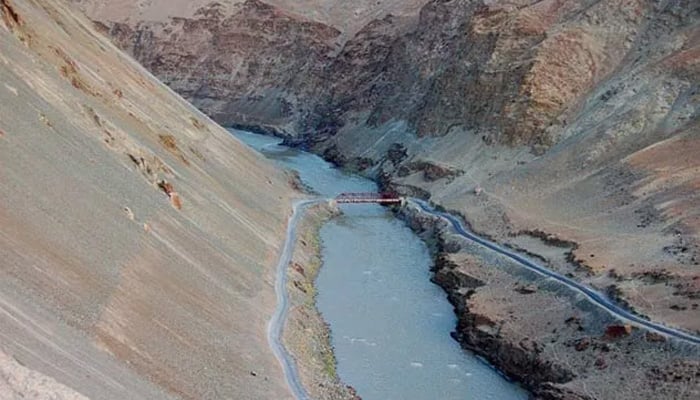Explainer: What is Indus Waters Treaty?
Pakistan says India unfairly diverts water with the upstream construction of barrages and dams
Following the killing of 26 people in Indian Illegally Occupied Jammu and Kashmir in April, India held the Indus Waters Treaty with Pakistan in abeyance.
New Delhi accuses Islamabad of orchestrating the deadly militant attack, an allegation that Pakistan denies.
On the basis of these baseless allegations, India started the war against Pakistan earlier this month, which was the heaviest fighting to have occurred between the two naighbouring nations in decades, before a ceasefire was reached last week.
Despite numerous turns in diplomatic relations, the pact had withstood three wars and other engagements between the fierce enemies.
Reuters reported on May 16 that Delhi is considering projects that would likely reduce the flow of water into Pakistan from rivers allocated to that country.
India says it will "keep the treaty in abeyance until Pakistan credibly and irrevocably abjures its support for cross-border terrorism," while Islamabad says "any attempt to stop or divert the flow of water belonging to Pakistan" will be an "act of war."
Indus Waters Treaty
The nuclear-armed neighbours disagree over use of the water from rivers that flow downstream from India into the Indus River basin in Pakistan.
The use of the water is governed by the Indus Waters Treaty, which was mediated by the World Bank and signed by the neighbours in September 1960.
The agreement split the Indus and its tributaries between the two countries and regulated water sharing. India was granted the use of water from three eastern rivers — Sutlej, Beas and Ravi — while Pakistan was granted most of the three western rivers — Indus, Jhelum and Chenab.
There is no provision in the treaty for either country to unilaterally suspend or terminate the pact, which has clear dispute resolution systems.
Concerns over water
The countries have argued over and disputed several projects on the Indus and its tributaries for years.
Pakistan is heavily dependent on water from this river system for its hydropower and irrigation needs. Pakistan says India unfairly diverts water with the upstream construction of barrages and dams, a charge India denies.
Pakistan is concerned that India's dams will cut flows on the river, which feeds 80% of its irrigated agriculture. It has asked for a neutral expert and then an arbitration court to intervene in two recent hydropower projects.
India has accused Pakistan of dragging out the complaints process, and says the construction of its Kishanganga and Ratle hydroelectric projects is allowed under the treaty. It has also sought modification of the pact to get around such delays.
How can suspension affect?
The suspension of the accord is not expected to have an immediate impact on the flow of water to Pakistan as India does not have enough storage capacity. However, water at a key receiving point in Pakistan briefly fell by as much as 90% in early May after India started maintenance work on some Indus projects.
India's move could also bring uncertainty to Pakistan's agricultural system.
The suspension means India can stop sharing crucial information and data on release of water from barrages/dams or on flooding, Indian officials said, adding that New Delhi will also not be obliged to release minimum amounts of water during the lean season.
Pakistan's reaction to treaty suspension
Pakistan says the treaty is a binding international agreement brokered by the World Bank and contains no provision for unilateral suspension.
Ghasharib Shaokat, the head of product at Pakistan Agriculture Research, called the treaty the backbone of the country's agriculture sector.
"It puts our agricultural future on shaky ground. If water flows become erratic, the entire system takes a hit — especially irrigation-dependent crops such as wheat, rice, and sugarcane," Shaokat said.
"Yields could drop. Costs could rise. Food prices would likely spike. And small-scale farmers, who already operate on thin margins, would bear the brunt of it."
Khalid Hussain Baath, chairman of a national farmers' union in Pakistan, painted the move as an act of belligerence.
"This is a true war," Baath said from Lahore. "We already have a water shortage because of climate change. Low rainfall this year, and limited snow means that the water level is already 20-25% lower than last year."
-
Security forces gun down 30 terrorists in multiple IBOs in KP: ISPR
-
MQM-P calls for new province in Sindh
-
US report validates Pakistan military edge over India: PM
-
Banned TTP poses serious threat to Pakistan security: UNSC panel
-
CM Afridi clarifies remarks on by-poll after ECP requests army deployment
-
Dubai sees 3.2m Pakistani passengers in 2025 as airport sets new milestone
-
Security forces kill 23 Indian proxy terrorists in KP's Kurram
-
Pakistan to construct island to boost oil exploration: report












